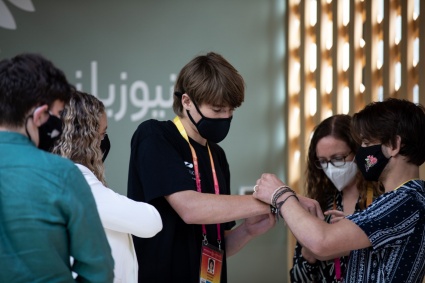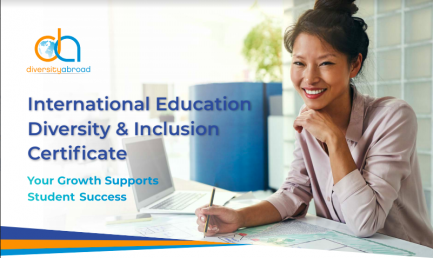Search
Showing 10 of 6623 results
-
Fourth cohort of 5,000 international students as a border exception
The students will be able to enter New Zealand from mid-2022 as a border exception, through a centrally managed process.
Student places will be allocated across the sector, based on the proportion of international students who were attending each type of education provider pre-COVID in 2019:
- University 1,450
- Te Pūkenga 700
- School (year 9 and above) 1,000
- PTE (including pilot training) 850
- English Language School 1,000
ENZ and the Ministry of Education are currently consulting with the peak bodies for universities, Te Pūkenga, PTEs, ELS and schools, on a draft implementation framework. The framework will include information on the allocation of places to providers, criteria for nomination of students to these places and all related processes. If you are an education provider who is not aligned to a peak body, you can request a copy of the draft framework by emailing c4@enz.govt.nz.
The implementation framework is expected to be finalised by 14 March 2022, and more information will then be made available for prospective students and the wider education sector.
Education providers will be responsible for determining eligible students to fill their allocation of places, and submitting information on these students to education agencies. Education agencies will confirm with providers that the students meet the criteria, and nominate these students to Immigration New Zealand.
As with previous border exceptions, students who are interested should talk to their prospective education providers and indicate their interest.
Expected timings are as follows:
- Mid-March 2022 – decisions begin to be communicated about the allocation of places to individual education providers
- Mid-late March 2022 – education providers begin nominating students
- 13 April 2022 – the border exception visa application process opens for cohort 4 students
- From mid-2022 – students are in New Zealand ready to begin their study.
We appreciate that the timings are tight, and everyone involved will need to work closely together so we can make the most of this opportunity.
Students will need to meet the same living cost requirements as the previous cohort, namely funds of $15,000pa for school students and $20,000pa for other students.
Students will also need to comply with the vaccination and other health requirements that apply at their time of travel. Read more about travel to New Zealand on the Unite against COVID-19 website: Travel to New Zealand
-
Showcasing New Zealand education at Expo Dubai
Representatives from the University of Waikato, Victoria University of Wellington, New Zealand education technology company ByteEd and Education New Zealand Manapou ki te Ao met with key contacts and forged new relationships during their 22-25 January 2022 visit to the Expo.
Events were hosted at the New Zealand Pavilion, and the delegation invited education stakeholders to take a new look at what New Zealand education has to offer, including online and pathway options. Attendees heard more from New Zealand’s universities and vocational training sectors, learned about government-to-government opportunities, and met with innovative New Zealand EdTech companies working in the region. The winners of the Global Kaitiakitanga Project, a sustainability-focused programme for New Zealand schools created by the NZ at Expo team and Young Enterprise (YES), also shared their student experience.
Guests at our events gained an insight into New Zealand’s unique cultural identity, with a tour through the New Zealand experience at the pavilion and performances from locally based kapa haka group Ngāti Koraha.
The leader of the education delegation, ENZ’s Regional Director, Americas, Middle East and Europe, Amy Rutherford, was interviewed by New Zealander Brandy Scott on the popular business breakfast show Dubai Eye. The interview aired on 24 January, to coincide with UNESCO’s International Day of Education.
While in Dubai, the delegation took part in the launch of NCUK’s International Foundation Year (IFY) at the University of Wollongong in Dubai. The IFY programme will lead to UAE and other students from Gulf Cooperation Council (GCC) countries and further afield studying at any of New Zealand’s eight universities in 2023 and beyond.
ENZ also held a workshop with delegates to look at ways to align our efforts in the GCC countries and wider Middle East region.
Expo is the largest global event to take place since the Covid-19 pandemic began. As at the end of January, organisers had recorded 11,608,240 visits to Expo, and the New Zealand Pavilion had over 750,000 visitors.
“It was important for ENZ and delegation members to show up and tell the New Zealand education story to the world. New Zealand remains keen to cooperate with partners on education, we have innovative ways to offer a New Zealand education, and we are looking forward to welcoming students to New Zealand again as soon as border restrictions allow,” Amy Rutherford says.
If you are interested to hear more about how ENZ can support your organisation’s approach in the region, please contact Bronwyn Shanks, ENZ’s Senior Advisor – Special Projects, Middle East and Europe, bronwyn.shanks@enz.govt.nz.
-
Dubai Expo Global Kaitiakitanga winners
The Global Kaitiakitanga Project was a partnership between New Zealand at Expo 2020 and Young Enterprise. With a focus on sustainability, the project provided high-quality business mentoring and international collaboration for young New Zealand innovators. In a seven-month programme from March to September 2021, five finalist businesses were supported to develop and scale their business proposals. Two entries were judged joint programme winners in a Dragons’ Den style pitch event in September 2021.
Four students representing the joint winners, Abalro Health and GreenKiwi Supplements joined guests as New Zealand’s Youth Ambassadors as part of their learning about doing business in the Middle East. The students were truly inspirational, and showcased the strengths of a New Zealand education, which encourages students to be critical thinkers, problem solvers and lifelong learners through independent projects and hands-on experience.

From Bayfield High School in Dunedin, students Robert Donohoe, Abby Green and Alex Livingstone (above) harnessed the power of raw barberries to create a natural supplement to treat acne. Their company, Abalro Health, is the only New Zealand-based company using barberries. Research has shown that barberries reduce acne by 43% in just four weeks.

Max Donaldson (above) of Kerikeri High School drew on his passion for olives to develop a first-to-market, New Zealand grown olive leaf supplement, which can support immune and cardiovascular health from what is normally an industry byproduct. GreenKiwi Supplements is a vertically integrated business developed by Max to pioneer traceable, New Zealand grown olive leaf for the global nutraceutical marketplace.
-
Publishing Association NZ launch international education website
Supported by funding from Education New Zealand Manpou ki te Ao (ENZ) under the Future Focus Programme (FFP), the new website profiles New Zealand education publishers for key export markets and customers. Earlier FFP research highlighted that being visible online was one of the key challenges facing New Zealand education publishers seeking to grow their exports.
The website enables education publishers to showcase New Zealand’s pioneering work in Reading Recovery, Big Book shared reading, and resources for the revitalisation of New Zealand’s indigenous Māori language and culture.
It aims to support marketing efforts in the key markets of Australia, China, the United States, and the United Kingdom. It will also be used to support New Zealand’s presence at major education publishing events, such as Bologna Children’s Book Fair and the Frankfurt Book Fair, in 2022 and beyond.
The website allows for a quick and easy search including by publisher, category, and publishing rights and demonstrates the quality of education products and services developed in New Zealand.
Alana Pellow, Business Development Manager at ENZ, says Catriona Ferguson, Association Director of PANZ and her team worked hard to bring this website to life, with the help of education publishers who provided great content.
“The outcome is a user-friendly, appealing and comprehensive website that will showcase the unique products and services of our education publishers to the world,” says Alana.
-
Strong interest in Aotearoa New Zealand from Latin America
Students ranked New Zealand second highest as a destination of interest for a future international education programme. The top factors influencing their decisions post-COVID-19 were visa processing, accommodation costs and the academic quality of the institution.
The top decision-making factors for agents were course costs, border settings and airfare costs.
New Zealand ranked highly for competence in managing the pandemic and health control, but it ranked fourth for agents on adequate infrastructure for the reception of international students in the near future. Both agents and students said face-to-face was the preferred mode of study.
Education New Zealand Manapou ki te Ao sponsored the survey run by the Brazilian Education and Language Travel Association (BELTA) across Latin America, to measure the impact of the COVID-19 pandemic on the international education sector.
ENZ’s Latin America team shared the BELTA Latin America 2021 survey results with around 50 industry representatives and agents at a virtual forum in December 2021.
The event also celebrated ENZ’s Recognised Agencies (ENZRA) for their contribution to maintaining the visibility of New Zealand’s education brand during the pandemic.
You can view the webinar and related materials on Intellilab here.
-
Alumni promote PhD study in NZ
Fourteen Vietnamese PhD students or alumni from our eight universities took part in the campaign, which generated extensive social media and other coverage.
The original plan to feature Facebook posts about outstanding PhD alumni and candidates was extended to include a webinar on 22 January 2022, “Ask NEW Anything: The PhD Journey”, involving five speakers from different areas of study: education, finance, food science, construction engineering and computer science.
The webinar generated a great deal of interest from participants, with numerous questions during the webinar and requests to connect with the speakers, as well as follow-up articles being published in the media.
One of the students was Phan Ngoc Quynh Anh, a PhD candidate at University of Auckland. Having worked as a lecturer at the University of Foreign Languages, Hanoi National University, and then completed post-graduate studies in Europe, Quynh Anh now has a scholarship from the University of Auckland where she is a third-year PhD student in education.
Quynh Anh is living in New Zealand with her husband and two young children, and says that studying in a country with good health, education and welfare systems for children was very important to her.

“I love the peace that New Zealand has to offer,” she says.
“The academic space at the University of Auckland is very open and free, and research materials are always abundant. I have two instructors who couldn't be better in the learning process.”
Van Banh, ENZ’s Market Manager, based in Ho Chi Minh City, says there is genuine interest from Vietnamese students in pursuing higher education in New Zealand.
“The New Zealand tertiary education setting is renowned world-wide for high academic standards, an excellent teaching community and a vigorous research network,” Van Banh says.
"Real-life opportunities, and a welcoming environment where innovation is encouraged have made New Zealand very appealing to Vietnamese students.
“Vietnamese students have access to a range of funding support, including some fully funded scholarships from the Vietnamese government, as part of a project to enhance the capacity of the Vietnamese university sector, improve research output and meet the increasing demands of students and industry.”
-
Opportunities to participate in two major education events in Middle East
Global Higher Education Exhibition Oman (GHEDEX Oman) will take place in Muscat from 27 to 29 March 2022, supported by the Omani Ministry of Higher Education, Research and Innovation. Secondary and tertiary students, parents, young professionals and education professionals from across the Gulf Cooperation Council region will attend.
Recent GHEDEX events have been held virtually due to the Covid-19 pandemic, but this year the event will have both face-to-face and virtual options. Alongside universities, GHEDEX 2022 is open to vocational training providers and EdTech companies.
The International Conference & Exhibition for Education (ICEE) is scheduled to take place in Riyadh from 8 to11 May 2022, organised by the Saudi Ministry of Education. Five New Zealand universities participated alongside ENZ at the 2019 event, which was previously known as IECHE. This year, organisers have opened up participation to include English language schools, aviation training providers, vocational education institutions, and EdTech companies.
“This is the first time these events have taken place in person since the beginning of the Covid-19 pandemic, and we know building relationships face-to-face is important in the Gulf region,” says Amy Rutherford, ENZ’s Regional Director, Americas, Middle East and Europe.
“This is also the first time these events have invited other education sectors to participate as well as universities. There are significant opportunities for English language schools, aviation training providers, and vocational education institutions to attract students from Saudi Arabia, Oman and other GCC countries, as well as opportunities for EdTech companies in the region,” Amy said.
ENZ will host a New Zealand pavilion and have on-the-ground representation at both events. If your organisation is interested in exploring opportunities in the region and would like to find out more about participation in these events – in-person, virtually, or represented by ENZ – please contact Bronwyn Shanks, ENZ’s Senior Advisor – Special Projects, Middle East and Europe, bronwyn.shanks@enz.govt.nz.
NOTE: Recent changes to our border settings mean that New Zealanders attending these events will not need to book a space in Managed Isolation and Quarantine on their return to NZ.
-
Diversity and inclusion in North America
“Partnering with marginalised communities around us to confront harm in our past is something we all have to practise,” says course co-ordinator David Wick, Associate Professor, Middlebury Institute of International Studies.
"What was striking was that, from the first in-person meetings, everyone was willing to make personal connections to the content, share their own learning and vulnerabilities, and very curious as to how they can learn from one another to create better learning environments.”
Diversity Abroad, based in US, is the largest organisation focused on diversity, equity and inclusion in international education. ENZ works with Diversity Abroad on a range of initiatives, such as the annual Global Inclusion Conference, as well as partnering to deliver the specially designed course.
Attended by 18 people from NZ universities and ENZ, the three-month certificate course was fully online. Workshops, group discussion, videos, articles and assignments kept the participants highly engaged, and feedback on the course was very positive.

Dr. Anna Foster, Study Abroad and Exchange Manager at the University of Canterbury, says the programme provided a comprehensive exploration of Access, Inclusion, Diversity and Equity (AIDE) in relation to student mobility.
“The programme was really valuable in gaining a deeper understanding of AIDE as it relates to Education Abroad, particularly due to the focus on considering every aspect of the student mobility journey in an end-to-end approach from the perspective of diverse cohorts,” Anna says.
“This has certainly influenced our team approach on an ongoing basis - it has shaped many of the continuing conversations we have around our outreach and processes, and has also helped us consider how we can further partner with both external and internal partners to better support our students.
“I think all of the group also found the programme to be impactful from a self-reflection perspective, prompting some really useful reflection on the backgrounds, biases and perspectives that shape each of us and how we can use this awareness as leaders and in our work with students.”
Anna also appreciated the practical focus of the course, and says her team is now considering some of the barriers to outbound mobility for diverse and under-represented cohorts, and working on strategies to address these.
Sarah Sung, Study Abroad Manager at the University of Auckland, also found the programme very beneficial.
“The programme has given me opportunities to delve into every single aspect of our team’s work through AIDE lenses as well as reflect on our past initiatives relating to diversity and inclusion. I learned that to make diversity work, AIDE should not be seen as a stand-alone project or matter but be embedded in our everyday life and all work,” Sarah says.
Sarah says AIDE conversations will be part of regular team meetings, as well as being integrated into team members’ KPIs and performance reviews, and she is working on a plan to increase participation from under-represented students.
“This includes extensive work in identifying opportunities to collaborate with partners for diversity and inclusion goals, reviewing our scholarship, communications and co-curricular programming for diverse students and developing a system for data collection.”
Lewis Gibson, ENZ’s Field Director North America, also took part in the course and says feedback from the cohort participants demonstrates the need for further AIDE learning in the New Zealand international education sector.
“Hearing from colleagues about the personal and professional measures they are actively putting in place to support under-served inbound and outbound students, as a direct result of this programme, is inspirational,” he said.
For more information about the International Education Diversity & Inclusion Certificate, contact Lewis Gibson at Lewis.Gibson@enz.govt.nz
-
Expanded collaboration agreement between UC and UGM Indonesia
The MoU between the two universities was originally signed in 2012, and renewed in 2021.
The renewed MoU aims to facilitate broader collaboration, including the development of short courses, student mobility, dual degree programmes, and study abroad exchanges, as UC looks to increase engagement in the Asia-Pacific region.
In comparison, the initial MoU was largely built around cooperation with the UC Geography Department under the Community Resilience and Economic Development programme (CaRED), a partnership between the New Zealand Ministry of Foreign Affairs and Trade (MFAT) and UGM, designed to contribute to sustainable development in Indonesia.
UGM and New Zealand speakers at the ceremony emphasised the importance of maintaining friendships and partnerships in the international education space, especially while we cannot connect in person. UGM referenced the impact of projects developed under the CaRED Programme, supported by MFAT.
UC’s Assistant Vice Chancellor of Engagement, Brett Berquist, reflected on his time spent in Yogyakarta, and on the work achieved through CaRED which included three NZ universities at the time – Massey University, University of Auckland, and UC, working with UGM on economic development research projects “particularly focusing on the Eastern parts of your country [Indonesia]. It was a really wonderful story of research collaboration coming together.”
“I’m particularly thrilled to continue a bilateral relationship between Canterbury and UGM which is well known to be the most prestigious institution in Indonesia.
“The challenges you face are significant, but at the same time, the thought leadership and the research you undertake for economic development and serving your region is also inspiring.”
Ben Burrowes, Regional Director – Asia at Education New Zealand Manapou ki te Ao, says the agreement aligns well with ENZ’s goal of building a more sustainable international education sector, with an increased focus on diversified products and services offered to learners both in New Zealand and across the globe.
-
Around the world in five: E-News February 2022
International
Has the pandemic redirected international student flows forever?
Survey: Covid-19 ‘significant’ impact on wellbeing
New Zealand
New Zealand has ‘continued interest from PhD students’ despite delays in border reopening: expert
Australia
Early signs of international student numbers rebounding (universityworldnews.com)
“They are missing, we miss them”: Plan to bolster city’s student reputation
Unlimited work hours for international students ‘could damage’ Australian reputation
Canberra announces Maitri initiatives to support Indian students at top Australian unis
India
How Omicron has affected the vision of studying abroad for students
United Kingdom
UK hits target of 600k international HE students 10 years early
The English test that ruined thousands of lives
Make immigration rules work for universities, expert says
United States


